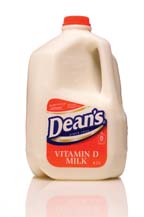
This year's Dairy 100™ finds the industry in a unique position: It's been nearly three years since the Dean-Suiza merger capped off the consolidation race of the 90s. Subsequent events lead to the emergence of National Dairy Holdings, another national player. Now HP Hood has finally acquired the Crowley and Kemps properties it has long desired, and while NDH has downsized a bit, both companies can legitimately be called national players, albeit of a smaller variety the one run by Gregg Engles.
Coincidentally, some of the largest, most established family-owned dairy companies have recently come under a new generation of leadership, and are embarking on new strategies.
At the top, Dean Foods is in a seemingly unassailable No. 1 position and is continuing to grow through innovation and marketing success.
The next largest full-line dairy company in the U.S. is still National Dairy Holdings. The company will shrink a bit more by next year with the sale of Crowley and Kemps to HP Hood. That will be offset slightly by the acquisition of Sinton Dairy, Colorado Springs.
Hood is poised to become a $2 billion company and a legitimate third national player in the United States milk market. But Hood CEO John Kaneb says it is difficult to look at the three companies in the same light.
"It's like comparing cats," Kaneb says. "Dean is a tiger and NDH and Hood are bobcats. Very different sized cats."
But at least one of those two bobcats will most likely be clawing for shelf space in most markets where the big tiger operates.
With different focuses and different markets, Hood, Crowley and Kemps are quite complimentary, Kaneb says. While the initial plan was to have three somewhat autonomous divisions under an HP Hood LLC umbrella, the recent resignation of two of Crowley's senior officers, Marty Margherio and Mikal Pedersen will expedite what would have been a more gradual integration of Crowley and Hood, Kaneb says. They have however been succeeded by other Crowley veterans.

Of course there are numerous other factors impacting the landscape of the industry, and the makeup and positioning of its top 100 companies, these include continued selective acquisitions, strategic partnerships, the growth of organic products and yogurt, and the recent big moves in the ice cream segment.
The result is that we have a noticeably different picture of the industry than we had just a few years ago in 1999. There were 16 billion-dollar companies in 1999, now there are 21. The top five used to represent about $12.8 billion in sales, this year it accounts for more than $20 million.
In 1999 the No. 100 spot was held by a company doing $76 million. Today that spot is held by a company doing $55 million.
From the billion-dollar-plus companies at the top of our list, to those not-so-small companies ranked in the 90s, it's a new era for dairy. Here's a look at the some of the events taking place in five tiers of the Dairy 100.
1-20 The order of the top seven is the same as it was last year. With its merger with Nestlé starting to show up on the books, Dreyer's climbs into the No. 8 spot up from No. 11. With strong performance of its yogurt brands, Yoplait gets a significant jump in our estimate, and enters the top 20 at No. 18. Overall Kraft Foods has not had a good year, but the dairy-only numbers it supplies to Dairy Foods are healthy enough. Land O'Lakes and Saputo grew a bit while Schreiber was down a bit due primarily to accounting rules. Schreiber has stayed on the acquisition trail, however and will grow more next year, having just acquired Level Valley Creamery (No. 70).
Again, watch out for No. 20 HP Hood. Total sales were up just a bit for 2003, but when the Kemps-Crowley acquisitions hit the books, Hood will move into the top 10.

41-60 CoolBrands International jumps way up to No. 43, thanks primarily to its aggressive acquisition strategy. The Canadian company was prepared to benefit from the Dreyer's-Nestlé merger and is enhancing its impressive brand portfolio with outstanding product innovation. Tillamook County Creamery is celebrating its 95th anniversary with significant sales growth.
61-80 A couple of organic companies are making news in this tier. Just two years ago Stonyfield Farm entered the Dairy 100 at No. 93 and has since leapfrogged up to 68. Don't expect the organic yogurt maker to slow down as it now operates two plants and is planning to add milk to its portfolio. Organic Valley, marketers of organic dairy and juice products, joins the Dairy 100 for the first time, probably belatedly, at No. 66.
81-100 The once-tiny Oberweis Dairy joins the Dairy 100 at No. 99. Home delivery, and gourmet ice cream are selling well in the company's expanding market.







